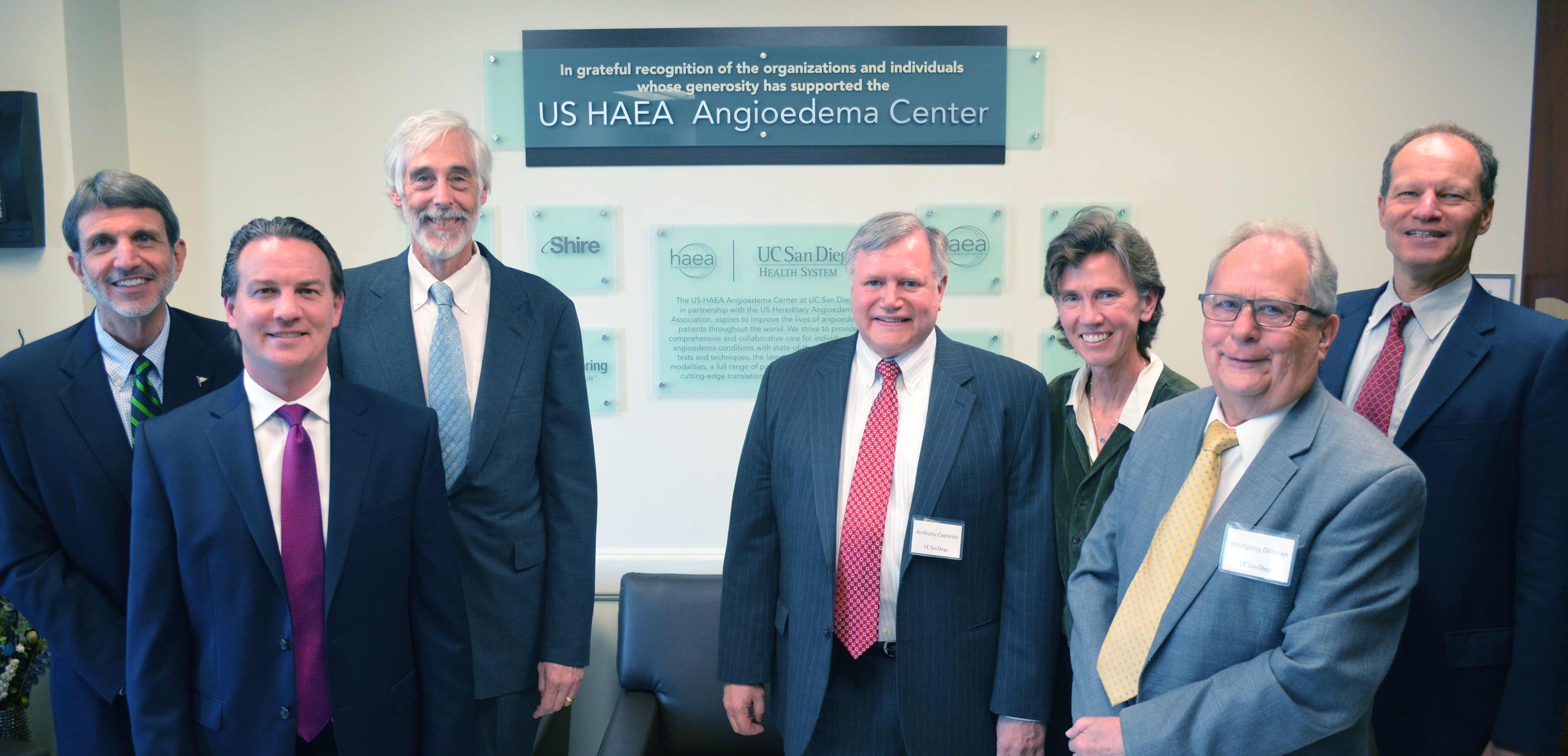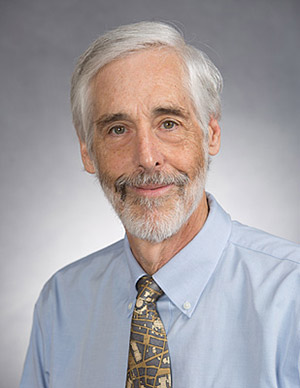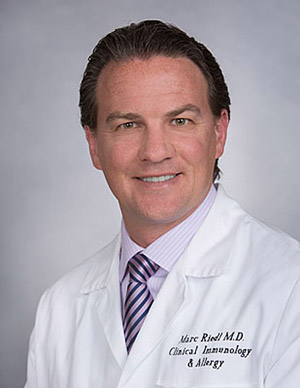
By:
- Judy Piercey
- Jackie Carr
Published Date
By:
- Judy Piercey
- Jackie Carr
Share This:
Patient Advocates and Big Pharma Fund Nation’s First Angioedema Treatment Center
US Hereditary Angioedema Association and four corporate partners endow center to treat rare hereditary swelling disease

Pictured at the grand opening of the US HAEA Hereditary Angioedema Center at UC San Diego are (left to right): Paul Viviano, UC San Diego Health System CEO; Dr. Marc Riedl, Center Clinical Director; Dr. Bruce Zuraw, Center Director; Anthony Castaldo, US HAEA President; Dr. Sandra Christiansen, Center faculty member; Dr. Wolf Dillmann, UC San Diego Department of Medicine Chair; and Dr. David Brenner, UC San Diego Health Sciences Vice Chancellor, UC San Diego School of Medicine Dean.
It is rare for an “orphan” disease (typically a condition that affects fewer than 200,000 people nationwide) to have a specific center dedicated to providing treatment and research. And it is even more unusual for big pharmaceutical companies to invest in an endowment to fund this type of center. Fortunately, the US Hereditary Angioedema Association (HAEA), a nonprofit patient advocacy organization, along with four pharmaceutical companies—Shire Human Genetics Therapies Inc., ViroPharma Incorporated (which merged with Shire), Dyax Corp. and CSL Bering—pledged a total of $4.6 million to help make the US HAEA Angioedema Center at UC San Diego Health System a reality. A number of individuals, including those with the disease, also provided private support.

Dr. Bruce Zuraw
The grand opening of the first-ever comprehensive angioedema center in the United States was celebrated Jan. 31. Diverse forms of swelling, known collectively as angioedema, may involve almost any area of the body. During attacks, patients are frequently unable to engage in normal life activities; the attacks could even be life threatening. What triggers the swelling is largely unknown.
“The US HAEA Angioedema Center at UC San Diego will lead the charge in establishing ‘model’ approaches to HAE treatment that focus on allowing patients to lead as normal of a life as possible,” said US HAEA President Anthony J. Castaldo. “As an advocacy organization founded and run by patients and caregivers, we have an inherently high level of empathy for what our patients go through in dealing with this chronic, debilitating and potentially fatal rare disease.”

Dr. Marc Riedl
Castaldo understands from personal experience the heavy financial and emotional toll this genetic disease has on families. “My oldest daughter began having frequent and debilitating HAE attacks at age five, and at the time, there were no acute therapies available,” he shared. “In fact, anabolic steroids to prevent attacks were the only therapies available in the United States. A treatment for HAE attacks was available in other countries, so we purchased the medicine (which was quite expensive) from overseas sources while simultaneously working with pharmaceutical companies who were conducting clinical trials to get desperately needed medicines approved in the U.S. Hundreds of HAE families have watched as loved ones suffer and, in the case of throat swellings, die from this dreadful disease.”
During his search for relief and care for the disease, Castaldo met Dr. Bruce Zuraw, UC San Diego professor of medicine, who offered hope. Today, Zuraw is the center’s director and inaugural recipient of the U.S. HAEA Endowed Chair at UC San Diego.
From research in genetics to the most advanced treatments, the center’s unique “bench-to-bedside” approach is at the forefront of personalized angioedema medical care. “With our research and clinical expertise and partnership with the U.S. Hereditary Angioedema Association, we can improve patients’ lives, save lives and ultimately find a cure,” said Dr. Zuraw.
Besides helping patients get properly diagnosed as early as possible, a driving factor for establishing the center is to consolidate the expertise now needed to navigate rapidly evolving treatment options for the disease.
Children of an affected parent have a 50 percent chance of inheriting the disease and hereditary angioedema is thought to impact one person in 50,000, suggesting that there are more than 6,000 affected individuals in the U.S. Because the disease is so rare, people with the condition often go undiagnosed or misdiagnosed for years.
“The disease may be misdiagnosed as a food or medication allergy, a bowel disorder or a gynecological condition, leading to unnecessary surgeries or even death if a patient has a swelling attack in the throat,” explained Dr. Marc Riedl, associate professor of medicine and the center’s clinical director.
Emmanuel Dulac, senior vice president of rare diseases at Shire Human Genetics Therapies Inc., added, “Our philosophy at Shire is to put patients and their caregivers at the heart of everything we do—it is what drives us on a daily basis and what we believe gives us a personal connection to the patient community.”
The new US HAEA Angioedema Center is located at 8899 University Center Lane in University Towne Center. Additional private support is needed to ensure treatment and a possible cure for those suffering from angioedema. Donors are encouraged to make a gift online.
Share This:
You May Also Like
Stay in the Know
Keep up with all the latest from UC San Diego. Subscribe to the newsletter today.


